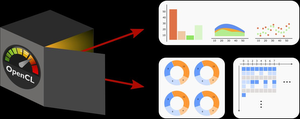Information
- Publication Type: Master Thesis
- Workgroup(s)/Project(s):
- Date: November 2015
- TU Wien Library:
- First Supervisor:
Abstract
The utilization of GPUs and the massively parallel computing paradigm have become increasingly prominent in many research domains. Recent developments of platforms, such as OpenCL and CUDA, enable the usage of heterogeneous parallel computing in a wide-spread field. However, the efficient utilization of parallel hardware requires profound knowledge of parallel programming and the hardware itself.Our approach presents a domain-specific language that facilitates fast prototyping of parallel programs, and a visual explorer which reveals their execution behavior. With the aid of our visualizations, interactions with the hardware become visible, supporting the comprehensibility of the program and its utilization of the hardware components. Furthermore, we aggregate behavior that leads to common issues in parallel programming and present it in a clearly structured view to the user.
We augment the standard methods for debugging and profiling by a visual approach that enables a more problem-specific, fine-grained way of analyzing parallel code. Our framework parses all program code and user-specified annotations in order to enable automatic, yet configurable code instrumentation. The resulting recordings are directly linked to interactive visualizations created with the well-known D3 (data-driven documents) framework.
To demonstrate our approach, we present two case studies about the visual analysis of memory bank conflicts and branch divergence. They investigate different parallel reduction implementations and a common image processing example (all from the NVIDIA OpenCL SDK). We show that our visualizations provide immediate visual insight in the execution behavior of the program and that the performance influence of the implementations is directly reflected visually.
Additional Files and Images
Weblinks
No further information available.BibTeX
@mastersthesis{Klein_Tobias_2015TIV,
title = "Towards Interactive Visual Exploration of Parallel Programs
using a Domain-specific Language",
author = "Tobias Klein",
year = "2015",
abstract = "The utilization of GPUs and the massively parallel computing
paradigm have become increasingly prominent in many research
domains. Recent developments of platforms, such as OpenCL
and CUDA, enable the usage of heterogeneous parallel
computing in a wide-spread field. However, the efficient
utilization of parallel hardware requires profound knowledge
of parallel programming and the hardware itself. Our
approach presents a domain-specific language that
facilitates fast prototyping of parallel programs, and a
visual explorer which reveals their execution behavior. With
the aid of our visualizations, interactions with the
hardware become visible, supporting the comprehensibility of
the program and its utilization of the hardware components.
Furthermore, we aggregate behavior that leads to common
issues in parallel programming and present it in a clearly
structured view to the user. We augment the standard
methods for debugging and profiling by a visual approach
that enables a more problem-specific, fine-grained way of
analyzing parallel code. Our framework parses all program
code and user-specified annotations in order to enable
automatic, yet configurable code instrumentation. The
resulting recordings are directly linked to interactive
visualizations created with the well-known D3 (data-driven
documents) framework. To demonstrate our approach, we
present two case studies about the visual analysis of memory
bank conflicts and branch divergence. They investigate
different parallel reduction implementations and a common
image processing example (all from the NVIDIA OpenCL SDK).
We show that our visualizations provide immediate visual
insight in the execution behavior of the program and that
the performance influence of the implementations is directly
reflected visually.",
month = nov,
address = "Favoritenstrasse 9-11/E193-02, A-1040 Vienna, Austria",
school = "Institute of Computer Graphics and Algorithms, Vienna
University of Technology ",
URL = "https://www.cg.tuwien.ac.at/research/publications/2015/Klein_Tobias_2015TIV/",
}

 Poster
Poster Thesis
Thesis


